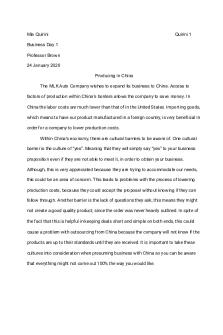Google in China Q1 DOCX

| Title | Google in China Q1 |
|---|---|
| Author | Mic Mitchel |
| Pages | 2 |
| File Size | 21.9 KB |
| File Type | DOCX |
| Total Downloads | 15 |
| Total Views | 100 |
Summary
Ayu Waritti Assignment – Google in China 23.05.2014 Google in China Q1: What philosophical principles did Google’s managers adopt when deciding that the benefits of operating in China outweighed the costs. Google’s managers made the decision to operate in China because of vast profit assumptions and...
Description
Ayu Warit Assignment – Google in China 23.05.2014 Google in China Q1: What philosophical principles did Google's managers adopt when deciding that the benefits of operating in China outweighed the costs. Google's managers made the decision to operate in China because of vast proft assumptons and predictons. Therefore they had to adopt to the local Chinese habits and the governments restraints and regulatons. But to which philosophical approach does this behavior refers to? Maybe on the frst sight it seems to be either the Cultural Relatvism or the Friedman Doctrine. But there are some details negatng this. First Google is not actng after the Friedman doctrine as they are not 100% pragmatc and ratonal. Google does concern about the major Chinese people's needs and wished for free speech and freedom in general. They don't adopt but the adapt and there is the crucial diference. They try to follow their own principles and want to provide "the greatest amount of informaton possible". This indicates, and is defnitly the intension by Google, that thy do not agree with Chinese regulatons. At least some informatons are more than nothing. Furthermore they decided to sign cencored and restraint websides for the customer's awereness. And it is not the Cultural Relatvism because of the actual easy reason that censoring and surpression are not a part of the Chinese culture. It is more just the surpression by a tyrant regime. The right approach Google's following ist the Utilitarian Phiilsoshi.8 It says "an acton is just desirable if it leads to best possible balance of good consequences over bad consequences" (Hill, 2009) and ". An Utlitarian considers all consequences and "focuses attenton on the need to weigh carefully all the social benefts and costs of a business acton and to pursue only those actons where the benefts outweigh the costs" (Hill, 2009). Q2: Ds .su tiink tiat Gsggle oisuld iave entered Ciina and engaged in oelf-cenosroiih, given tie csmhan.'o lsng-otanding mantra "Dsn't be evil"? Io it beter ts engage in oelf- cencsroiih tian iave tie gsvernment cenosr fsr .su? It might be trivial but the issues of language and of course the cultural and religious dferences Google has to face would probably have led to a bad misunderstanding. Would Chinese people understand that evila is another word for bad and not the christan approach of Satan. It might be possible this wouldn't have been confrmed by the government. Secondly the new mantra used in China implicates some critcism. It is better to engage in self-censorship for Google because the government would likey surpress and censor in arbitrariness and more widly than Google itself. The providers service would become degenerated and actually useless. Q3: If all fsreign oearci engine csmhanieo declined ts inveot directl. in Ciina due ts csncerno sver cenosroiih, wiat ds .su tiink tie reoulto wsuld be? Wis wsuld beneft frsm tiio actisn? Wis wsuld lsoe tie msot? First the direct investment in China stmulates the economy and probaply helps local start- ups and the the labor over all. Jobes are created and a raising prosperity is the long-term result. Thus the frst beneft is fnancial. Of course the government benefts as well but the...
Similar Free PDFs

Google in China Q1
- 2 Pages

Producing in China Essay
- 3 Pages

HR Challenges in China
- 6 Pages

Commercial Revolution in China
- 2 Pages

Bevölkerungspolitik in China
- 13 Pages

Swisse In China - Project
- 26 Pages

Uber in China Individual report
- 4 Pages

KFC in China (Jenish Patel)
- 1 Pages

Case Study ASOS in China
- 2 Pages

Q1
- 3 Pages

Q1
- 6 Pages

Zara in China and India Case study
- 26 Pages
Popular Institutions
- Tinajero National High School - Annex
- Politeknik Caltex Riau
- Yokohama City University
- SGT University
- University of Al-Qadisiyah
- Divine Word College of Vigan
- Techniek College Rotterdam
- Universidade de Santiago
- Universiti Teknologi MARA Cawangan Johor Kampus Pasir Gudang
- Poltekkes Kemenkes Yogyakarta
- Baguio City National High School
- Colegio san marcos
- preparatoria uno
- Centro de Bachillerato Tecnológico Industrial y de Servicios No. 107
- Dalian Maritime University
- Quang Trung Secondary School
- Colegio Tecnológico en Informática
- Corporación Regional de Educación Superior
- Grupo CEDVA
- Dar Al Uloom University
- Centro de Estudios Preuniversitarios de la Universidad Nacional de Ingeniería
- 上智大学
- Aakash International School, Nuna Majara
- San Felipe Neri Catholic School
- Kang Chiao International School - New Taipei City
- Misamis Occidental National High School
- Institución Educativa Escuela Normal Juan Ladrilleros
- Kolehiyo ng Pantukan
- Batanes State College
- Instituto Continental
- Sekolah Menengah Kejuruan Kesehatan Kaltara (Tarakan)
- Colegio de La Inmaculada Concepcion - Cebu



